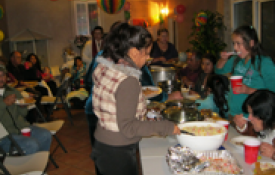
Articles from Divine Love Ministries:
-
- by Patrick
- 01-05-2024
2.00 of 1 votesOh, dear Jesus, it is my faith and desire for you that brought me to you at this time. You know me better than I think know myself. You understand the deepest desires of my heart better than I can ever imagine. You formed me in my mother's womb and you know me by my name. I can never hide from your love. I surrender myself to you because you are forever faithful and ever true to your promises. You said that the door will be opened to me if I knock, that I shall find if I seek. Now, I have come before you, not just to ask but to lay bare before you who made me and kept me in being. No one has ever visited you, Lord, or called upon you without obtaining your mercy. With all my heart, I thank you for choosing me. I thank you for redeeming me and making me a child of God! I come to adore you for the wonders of my being. I thank You for this opportunity to come into your divine presence. Forgive me, my Jesus, for the many times I have wounded you by my sins. Purify me, Lord, for my sinfulness makes me uncomfortable before you. Enkindle in my heart the fire of your love. Give me, oh my Jesus, the grace to see you in everyone and to love my neighbors with your love. Grant that I may visit you always, for your presence fills me with joy! (Silence) ...... Whoever comes to Me I will never drive him away. No one ever comes to Me and goes back empty handed. I am and will always be a loving Father to you. I take delight in you. I alone know my plans for you. What are your fears?..............................................................................................................................................................................[pause for awhile]. Are you afraid of your future? ... [Pause] Are You worried about Your family, your relatives, a personal project, about your life partner? ... Are You disturbed about Your job? Are you worried about the misunderstandings or prejudices people have against you? ... [Pause]. My child, be at peace! Nothing ever happens without the knowledge of your God. Leave whatever troubles your soul with me and go home with my peace. There will be an answer. Thank you Lord for spending time with me a poor and miserable sinner. Your presence in me is the reason for my being. Give me your grace that I may never lose sight of your love. Be with me to guide and protect me. And may I always remain a channel of your love and goodness to all I may encounter this day. Amen You may send us your prayer request or share with us your testimonies as the Lord answers you. It is God's wish that all may know his works and so praise him. You are welcome to contact us at: Phone. (818)322 3346; email: contact@divineloveministries.com, or write us at: P.O. Box 2403, North Hills. Ca. 91393.USA.
-
- by Patrick
- 01-05-2024
0.00 of 0 votesIt is always better to take refuge in the Lord than to trust in men. Human beings may be uncaring but weak, hence can make mistakes and may not always be there for one another. We live in a real world with its blessings and challenges. We have to face our own life challenges such as sicknesses, death, disappointment, betrayal of trust, etc. In spite of our desire to do good, we are often found wanting and insufficient. On the contrary, our Lord is immortal and an "ever - present help in affliction" (Psalm 46:2). In Psalm 91 the Lord says, "call on me when you are in trouble and I will answer." The one who takes refuge in the Lord according to Jeremiah 17:18 "will be like a tree planted by the water that sends out its roots by the stream. It does not fear when heat comes; its leaves are always green. It has no worries in a year of drought and never fails to bear fruit." "He is like a tree planted by streams of water, which yields its fruit in season and whose leaf does not wither. Whatever he does prospers" (Psalm 1:3). Thus shall you become the best of who you are called to be should you put your trust in Lord. This is not a promise of earthly glory but an assurance of a tranquility of mind that transcends human imagination in this life and in the life to come.
-
- by Patrick
- 01-05-2024
0.00 of 0 votesJesus gave his life that we may not just have life but have it in abundance. In his sacrifice on the cross, Jesus made us aware that the greatest purpose of life is in our care and service for others. Thus, Jesus says, "I give you a new commandment, love one another as I have loved you" (Jn.13:34 – 35). His expectation transcends "simply giving of money and clothes" to others for giving sake. The rationale for this command springs forth from the fact that we are all interconnected and interdependent, hence no one is self-sufficient. One's response to Jesus' command becomes fruitful whenever we strive out of love to reach out to others in love especially the less privileged in our midst, to provide them with what is perhaps missing in their lives. Our love for God could also be expressed in our dedication to an active prayer life, caring for the sick and needy, working for reconciliation with our friends, neighbors and family members. To identify with this noble task is a practical way of responding to Jesus' command to "love as I have loved you." And the God who sees what is done in secret promises to reward all who participate in the cultivation of love on earth. It is based on this divine mandate that the members of the Divine Love Ministry prayer group rededicate their lives every day to prayer and charitable works.
-
0 JOURNEY TO THE KINGDOM OF GOD
- by Patrick
- 06-04-2024
0.00 of 0 votesThe kingdom of God is likened to a treasure hidden in a field and a man found it, he hid it again, and then in his joy went and sold all he had and bought that field. Similarly, the kingdom of heaven is compared to a merchant looking for fine pearls and when he found one of great worth, he went away and sold everything he had and bought it (Mathew 13: 44-45). The journey to the kingdom of God is necessary and needs preparation and focus at all time. Those who desire and work towards entering this kingdom need to keep watch for the coming of the king of kings like the five wise virgins who came with their lamp and extra oil to wait for the arrival of the bridegroom at the marriage banquet (Mathew 25:1-13). In preparing for the kingdom of God, children of God need to guard their faith and free from every distraction and also, avoid being unequally yoked with unbelievers (2 Corinthians 6: 14). As children of God, being in close relationship with unbelievers could pose a big challenge on living a righteous and holy life. Therefore, let us not let the oil of our lamp be put out or taken away from us by anyone or circumstances. The oil of our lives (truthfulness, honesty, righteousness, purity, faith, commitment to God, holiness, love etc) can be taken away from us if and when we become weak in prayer or careless with the way we live our lives. Hence, the bible tells us that we are the light of the world, a town built on a hill that cannot be hidden. Let us as therefore, as reminded by the bible, let our light so shine before men, that they may see our good works and glorify our Father in heaven (Mathew 5:14, 16).
-
- by Patrick
- 18-01-2021
0.00 of 0 votesThe power of speech is one of the greatest powers ever given to human beings by our creator. It is by his words that God created the world and everything in it. He said, "Let it be and it came to be" "let us make man in our own image and likeness - you and I became the end product of that word. As the product of God's word, we cannot grow in our relationship with God unless we are mindful of what we think and say for anyone can know the stuff we are made of based on the words that come out of our lips. The apostle James 3:2 says, "If any man offends not in words, the same is a perfect man." And one of the gifts of the Holy Spirit is the gift of speech and all who nourish this gift have the power in them to speak words that permeate the depth of the human spirit. Good and Evil - the gift of speech is a great and noble gift. It could build and destroy kingdoms, empires, nations, families and relationships. The apostle of practical Christianity, James 1:26 says "If a man who does not control his tongue imagines that he is devout, he is self deceived; his worship is pointless." It is often said that." The tongue is an organ that can make evil attractive. By the tongue, men can make the worse appear the better reason. By the tongue, men can excuse and justify their wicked ways. By the tongue, men can persuade others into sin. By the tongue, men can give others broken hearts and sleepless nights." Shakespeare said, "Who steals my purse steals trash; But he who filches from me my good name. Robs me of that, which enriches him. He makes me poor indeed and miserable forever." Taming the Tongue - the tongue may be one of the small parts of the body, yet it has all the power to control and shape the entire person. James 3:3-5 says "once we put a bit into the horse's mouth, to make it do what we want, we have the whole animal under control. Or think of ships: no matter how big they are, even if a gale is driving them, the man at helm can steer them anywhere he likes by controlling a tiny rudder. So is the tongue only a tiny part of the body, but it can proudly claim that it does great things." The Difficulty of Controlling the Tongue -James 3:5-8 goes on to remind us how difficult it may become to tame this small part of the human body, "consider how small a fire can set a huge forest ablaze. The tongue is also a fire. It exists among our members as a world of malice, defiling the whole body and setting the entire course of our lives on fire, itself set on fire by Gehenna. For every kind of beast and bird, of reptile and sea creature, can be tamed and has been tamed by the human species, but no human being can tame the tongue." This is why James 3:2 says "for all fall short in many respects, if anyone does not fall short in speech, he is a perfect man, able to bridle his whole body also." The commandments - in the commandments we see what human relationship should look life. It is in the commandments that we see how to please God and be pleasing to God. It is not about either God or Us. but it's all about both God and Us. The 8th commandment says - "You shall not bear false witness against thy neighbor." This commandment calls for a positive use of the power or gift of speech to praise God and to build a healthy community of love, peace and justice. It forbids the abuse of the gift of speech. We could abuse this gift through - lying, gossip, destroying another's reputation, unjust criticism, insults, divulging secrets, judge or condemn another without evidence, revealing the sins of another, perjury, withholding to speak the truth in the face of injustice (unjust silence), etc. Proper use of the tongue - Good Name: it is morally wholesome to keep the good name of others even if they are our enemies, for they are entitle to it by the mere virtue of the fact. Proverbs 22:1 says "a good name is more desirable than great riches and high esteem than gold and silver." The Catholic morality has this to say "it is a serious matter to take away the good esteem of another because amongst man's temporal possessions nothing is more precious than his good name, if he lack this he is prevented from doing many good things. Therefore, it is said: Take care of your good name, for this will be a more lasting possession of yours than a thousand valuable and precious treasures" (Aquinas, T. ST 2.2q 7.3a 2). While it is true that some people may end up destroying their own reputations by their wrong choices, it is also true that some people's reputation is intentionally destroyed by evil minded people. However, no matter what others may say, you are still the best destroyer of your own reputations. You can never go wrong keeping your good reputation safe. Detraction - we sin by detraction whenever we reveal the hidden faults of others without necessity. No one likes to makes his personal faults public and we would not expect others to do the same. However, out of pride or to put someone down we often try to publicize his/her weaknesses so that he may not appear superior to us. However, this is different from talking about issues that have been made public either by the press or by court decision, in which case talking about such issues may not be classified as detraction. Detraction occurs when we reveal others secret faults without sufficient reason. Justice may demand that a hidden fault of another be revealed when by so doing harm may be averted, wrongs corrected, punished or avoided. In this case, there is a necessary reason to do so. Example, one is duty bound to report his brother who is not doing his homework or not doing well in school. This is to help him to improve in his studies. Slander -this happens whenever we reveal someone's fault with the intention of harming or injuring his/her good name. It is a defamation of character since the sole aim is to make another's fault to be known to others. In slander, a person's fault is often exaggerated to make it look worse than it is. Calumny - the sin of calumny occurs whenever we maliciously impute on others, faults which they did not actually commit or to exaggerate a person's fault. Ps 8:3 - the poison of the asp is under their lips. In the story of Susana, we see a good example of calumny. If the God-fearing man called Daniel were not there to intervene on behalf of Susanna, she would have been buried alive or stoned to death. Another example is the story of Potiphar's wife whose wicked heart enticed to falsely accuse the chaste and innocent Joseph. We see the sin of calumny in us and in others. We need the grace of God to overcome such tendencies in us by maintaining a positive mindset so that we can not only count our blessings but also see abundance of blessings in others (Mtt 7:1-5) (see onyeocha A). You may send us your prayer request or share with us your testimonies as the Lord answers you. It is God’s wish that all may know his works and so praise him. You are welcome to contact us at: Phone. (818)322 3346; email: contact@divineloveministries.com, or write us at: P.O. Box 2403, North Hills. Ca. 91393.USA.
-
0 Matthew 25: 31 - 46 "Whatever you do to the least of my brethren, you did to me"
- by Patrick
- 18-01-2021
0.00 of 0 votesThis parable contains one of the most radical teachings of Jesus to his disciples. The scene of this parable is the Parousia yet its central message is not so much about "the last judgment" as it is about the "core of the moral teachings" of Jesus which should be observed here and now. The faithful Jew expects himself to be judged on two standards - the observance or non observance of the law. He also expects a preferential treatment for being a Jew. Now listening to this new standard which says that everyone (both Jews and Gentiles) shall be judged based on their reaction to the needs of others, posed a great challenge to them. All nations ... here refer to all people of every race, language and culture By insisting that the final judgment shall be based on our actions does not in any way imply that faith in God is not necessary for salvation. For Matthew, faith in Jesus is the first movement of a person toward God. Faith in God must necessarily be translated into action. James 2: 20 Separate sheep from goats... In Palestine, it was common to see sheep and goat feeding together, yet at the end of the day each go to their separate places of rest. Comparing the good people to sheep - an animal with a low IQ and often gets into trouble, points to how infinitesimal our good deeds are when compared to the generosity of God. The King - Jesus is addressed as king in this parable. This title is not very common in the gospels and probably points to its ecclesiastical expansion. The kingdom - this is does not necessarily refer to the kingdom that Jesus proclaimed but to the "eschatological kingdom" that is prepared "from the foundation of the world." But the message proclaimed is relevant to both notions of the kingdom. (The rabbinical tradition taught that the kingdom of the Messiah was created before the foundation of the world). The corporal and spiritual works of mercy - ministry to the basic needs of one's fellow human being forms the list of needs mentioned in this parable. Judgment is primarily focused on our behavior toward our fellow human being. These are simple works which we are not accustomed to see as our duties towards others. "...and did not minister to you?" Jesus identifies himself with those to whom service is given or denied. Our behavior toward our fellow human being is inseparable from our behavior toward God (love of God and neighbor). The surprise of those who are condemned can be understood because they never imagined that God could be encountered in their fellow human being. Eschatology implies that every person is capable of a final decision that gives one’s life a permanent character. Both the righteous and the wicked make decisions that are irrevocable and binding. Lesson 1--Simple goodness - each of us can achieve greatness in life by doing simple things in great ways. We often wonder what we can do to help others in need. We may not be able to build a school for the education of children, hospital for the sick, house for widows/orphans, or prevent natural disasters, yet each of us is capable of feeding the hungry, clothing the naked, visiting the sick, etc. (Mk 9: 41, Mtt 10:42). It is simple goodness that pleases the Master and wins His approval. 2--Unconscious goodness - the people who were praised in the parable did not actually know the full implication of their good deeds. They were unconscious of their charitable works - their corporal work of mercy; their kindness, sympathy and generosity were quite spontaneous. This is the type of goodness that pleases the Lord. Your right hand should not know what your left hand is doing so that your father who sees in secret will reward you (Mtt 6:3). The best kind of giving is when the giver does not know to whom s/he is giving and the receiver does not know from whom s/he is receiving. Good deeds done for the sake of reward or prestige are not godlike. Real goodness does not want its name mentioned. Its thrill is the thrill of seeing someone go home happier than one was earlier. 3--Pride and regret - "if we had known that it was you who was in trouble we would have helped quickly and eagerly enough." There can be an element of snobbery in giving. We would often give cheerfully to a well-known person who happened to be in need, while neglecting or would not notice the need of an ordinary person in our midst. True Christian charity should be free from selectivity or preferential treatment. We ought to give because it is good to help anyone in need. 4--Calculated charity - we do not want our charitable acts to be indiscriminate. Many would like to give to organizations that would manage their donations well while ignoring individuals that they do not trust. The only problem with this mind-set is that it removes any personal element from our charitable acts. How often have we donated to Red Cross and Salvation Army while ignoring the beggar on our streets? As Christians we must risk being swindled in order to help someone who is in need of our help. The calculated generosity is unchristian, for God did not measure His love according to what we deserve. Christ died for the sinner even more than He died for the good ones. 5--The principle of Judgment - God may not subject us to the test by asking us to recite the creed or to quote certain passages of Scripture or how sound is our theological perspective. The simple question is – WHAT DID YOU DO TO MAKE LIFE EASIER FOR OTHERS? The answer to this question is neither based on the great contributions to human welfare which the newspapers reported nor on orthodoxy, but on our actions and interactions with the people we meet every day. After her death, it was written on a certain mother's tomb thus "She made life easier" - an excellent tribute both in God's and human eyes. Our parable does not ask WHAT DO YOU KNOW? WHAT DO YOU THINK? All it asks is WHAT DO YOU DO? 6--Whatever you do to the least of my ... Jesus taught us that God is our father. Therefore, whether we know/believe it or not, we are all children of God (brothers and sisters in Christ). The best way to please a parent is to do good for his children, for parents are more grateful for whatever good done to their children than if it is done to them. And so is God. In the strict sense of it, WE CAN DO NOTHING FOR GOD AND CAN GIVE NOTHING TO GOD, for God being God has everything. But we can do something for someone who is a son or daughter of God, hence the best way to do things for God is by doing them for our fellow human beings. WHATEVER IS DONE FOR OTHERS IS DONE FOR GOD. It is love that determines whether people are good or bad - if our love is active, failure to reach perfect morality in other ways will be rare, and it will be forgiven. But there is no substitute for love that is active and generous. An old legend of St. Martin of Tours - the Soldier Saint. One cold winter day Martin was entering a city and a beggar asked alms. Martin had nothing to give him. But the beggar was blue with cold and Martin took off the old battered soldier's cloak he wore, cut it in two and gave half to the beggar, who blessed him and was gone. That night Martin had a dream. In it he saw heaven and all the hosts of heaven and Jesus, in the heavenly places, was wearing the half of a Roman soldier's cloak. One of the angels came to him and said, "Master, why are you wearing that old cloak?" And Jesus answered, "My servant Martin gave it to me." The traditional enumeration of the corporal works of mercy is as follows: To feed the hungry; To give drink to the thirsty; To clothe the naked; To shelter the homeless; To visit the sick; To ransom the captive; To bury the dead. The spiritual works of mercy are: To instruct the ignorant; To counsel the doubtful; To admonish sinners; To bear wrongs patiently; To forgive offences willingly; To comfort the afflicted; To pray for the living and the dead.



